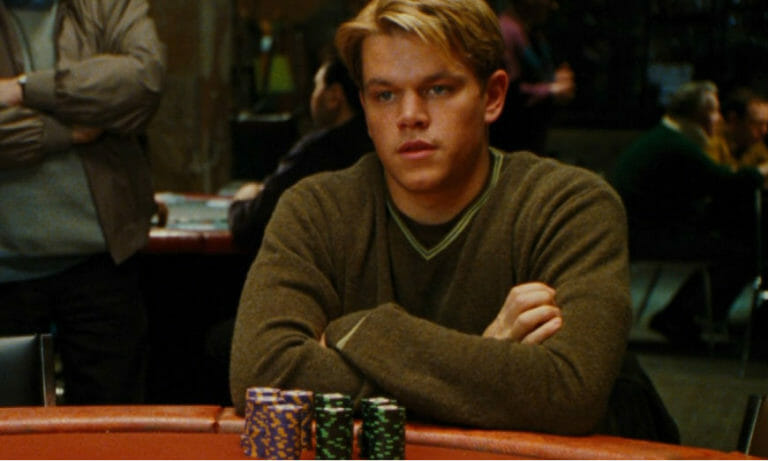Sign up for the
TSL Newsletter
and get $50 off Final Draft 12
By Eric Owusu · June 7, 2015

As far as crime drama screenplays go, there’s usually a scene or some role that illegal, underground gambling plays to establish a seedy atmosphere. Gambling is effective at that, and embodies organized crime well. It’s illegal, but civil. If a character messes with the wrong people or doesn’t pay what they owe, gangsters come out to collect.
In David Levien and Brian Koppelman’s screenplay for Rounders, we see how the sordid world of underground gambling can function through the eyes and experiences of our gambling narrator-protagonist Mike McDermott.
When penning your gambling screenplay, it’s helpful to keep a few things in mind as you make decisions in conveying your tale. There are several ways to do so, but here are a few ones that have worked well in Rounders and other gambling movies.
Read More: Vegas Movies: A 20 Year Fascination with Sin City
Introduce The World, Terms, & Gamblers
In the very beginning of Rounders, we get all three introductions. As a primer to the visual and audible introductions to the players in the biggest illegal gambling room in New York City, we get these words of wisdom from Mike:
“Listen, here’s the thing. If you can’t spot the sucker in your first half hour at the table, then you are the sucker.”
From the jump, we get a sense of the things taking place throughout the movie. Mike’s voice-over narrates as he collects money from different hiding spots in his apartment and leaves his girlfriend in the middle of the night. The protagonist of Casino, Sam Rothstein, effectively narrates the classic gambling movie as well.
Mike goes straight to the gambling room, introduces key players, jumps into an expensive game, and explains gambling terms, strategies, and backstories, which gives the audience a guided tour and hooks them into the action with tension and anticipation. Through his explanations, terms like “sharks, grinds, and bankrolls” are defined as he uses them to pull us deeper into this world that many people aren’t familiar with at all. When crafting your gambling screenplay, introduce it as such early and clearly. It’s common to have a first person narrator guide the audience, but it’s not a rule set in stone.
Establish The Supporting Characters
Unless you’re writing a gambling movie about a gambler and their adventures with people they never meet while gambling online, I’d suggest putting a diverse and captivating supporting cast around your protagonist. In Rounders, we meet Mike’s gambling friends Joey Knish, Worm, and his gambling adversary Teddy KGB. We meet his girlfriend Jo and his helpful professor Petrovsky. These people round out the cast of Rounders and help advance Mike’s story as moving gears of the plot.
Jo doesn’t want Mike to gamble. Worm wants Mike to gamble. Teddy KGB wants Mike to gamble so he can take all of Mike’s money. Petrovsky wants Mike to succeed and loans him $10,000. These characters help and hinder Mike’s desire to make money, finish school, help Worm pay off his outstanding debt, and attain his ultimate goal of going to Las Vegas. When writing your gambling screenplay, include an array of characters that help make understanding and taking in conflict possible in gambling environments and situations.
Show The Audience The Inescapable Problems
Because we have Mike narrating, we know exactly what he’s thinking, as he’s telling us his story. For Mike, his conflicts are exacerbated by his confidence in his ability to win high-stakes games, his soft spot for his troubled friend Worm, and his desire to do right by Jo. He cannot do it all, while successfully rounding. Things would be too easy and boring if he could effortlessly give one of his ambitions up for another.
We see how and why he’s trapped in the situations around him. With your screenplay, clearly show how your protagonist gets into sticky situations, how they cope with being in them, and how they try to deal with them. Even if there isn’t a single gambler in your audience, people will always relate to having problems and not knowing how to solve or escape them.
Have Gambling Games Occur That Are Much More
In the “boss battle” at the end of Rounders, Mike goes back to Teddy KGB’s high-stakes room where his tale began and plays him in a No-Limit game of Texas Hold’em. Mike wins the game and can walk away, having paid Worm’s debt back and having half of Petrovsky’s loan secured. But Teddy taunts Mike and gets him to come back and play some more.
Mike’s pride and confidence are tested and he loses heavily early in this rematch. Mike comes full circle, exhibiting bad decision making and taking on more than he can seemingly handle, which have plagued him for the entirety of Rounders; until Mike’s fortune changes.
This movie is about more than gambling. Each game has Mike explaining things and learning things about other gamblers and himself. Conflict abounds and he takes it on headfirst. In your screenplay about high stakes games, have more take place in them than just cards and chips. Have egos collide and lessons learned. Keep those scenes compelling with unexpected bets and outcomes, but also with character development and change. Gamble, and win.